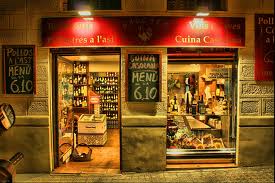 |
| Typical restaurant front |
 |
| Tapas |
From an English point of view, it can take a bit of getting used to as it sounds very direct which is contrary to the English way of asking for things (in most cases). Unless you're in high society in Spain, it 's doubtful you'll need to use 'could' and 'would' in relation to asking for things in a restaurant. Here's some useful words and phrases to use when ordering. The words in brackets show how the Spainsh word's pronounced.
Oiga - Is like saying 'hey' to get the waiter's attention, it's pronounced oye-ga.
Camarero/a - waiter/ress
¿Me traes la carta por favor? - Could you bring me the menu please?
¿Que te recomiendas? - What would you recommend? ( rec-com-me-end-das)
¿Cual es el plato típico de aquí? - Which dish is a local speciality?
¿De que consiste? - What's in it?
Quiero..... - I would like.... (key-ro)
Para mí.... - For me.... (mí is pronounced the same as me)
Trae pan por favor - Could you bring some bread please?
Otra botella por favor - Could you bring another bottle please? (bot- teya)
¿Donde estan los servicios? or ¿El baño por favor? - Where is the toilet/bathroom please?
La cuenta por favor - Can we have the bill please?
 |
| Tapas bar |
 |
| Board advertising the menú |
If you're looking for vegetarian food and you're not in Barcelona, you going to find it hard. There isn't such a thing as veggie burgers and what goes for a sandwhich 'vegetal' contains tuna. In Spain, what would be regarded as a vegetarian option would be a fish dish. I'd suggest asking for things like 'Verduras a la Plancha' which is grilled vegetables like peppers, asparagus and aubergine, or Tortilla Española which is of course a Spanish omelette. Also, be specific about salads, they often contain tuna, 'sin' means 'without', so 'sin atún' is 'without tuna'. To be clear that you don't eat meat or fish, 'Soy vegetariano/a' - I am a vegetarian. 'No como carne ni pescado'- I don't eat meat or fish. And there's always patatas fritas (chips) if nothing else.
 |
| Tapas and wine |
When ordering, you can choose between ordering tapas or raciones which are larger portions of tapas or platos, which are dishes served with potatoes and vegetables, which is called 'guarnición'. These are normally preceded by 'entrantes' (starters) and followed by 'postre' (dessert).
 |
| Hake with clams |
If you see 'servicio incluido' on the menu this means that service is included in the price, although it usually isn't and tipping for service is the normal thing to do. In Spanish VAT is IVA and it should show on your bill the percentage of IVA added. The menu should also state whether IVA is 'incluido' in the individual prices of the dishes.
If the waiter likes you, you may be invited to have a 'chupito', a shot of liqueur normally Orujo which is like the Italian Grappa. Remember, 'Te invito' means you are being invited to a free chupito, so make sure it doesn't appear on the bill. Also, 'de la casa' means 'on the house', in case you're lucky enough to hear that.
 |
| Restaurant in Mallorca |
http://enjoyingspain-melissa.blogspot.com/
No comments:
Post a Comment